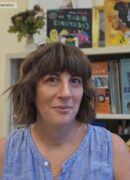Course Information
| Session |
|---|
| Credits | 1.5 CEUs or 15 PDHs |
|---|---|
| Registration dates | We accept registrations through the first week of classes, unless enrollment is full, and unless the class was canceled before it started due to low enrollment. |
$250.00
Dates: September 7 - October 4Credits: 1.5 CEUs or 15 PDHs
How do these science and math concepts support STEAM education? How do they support early literacy? How can our traditional storytimes support these concepts? And . . . how can we help adults incorporate them into daily conversations and experiences with their young children? Gain an understanding of cognitive, scientific and mathematical thinking from newborn to age five and build on traditional storytimes to explore strategies and techniques to support the STEAM concepts and early literacy.
While the information and activities in this training can be used to offer separate STEAM programs, the approach in this course is that these concepts are on-going in all we do, including our storytimes. By becoming aware of these connections using books and other activities, we also help storytime participants, children and adults, understand and build on these concepts throughout the day.
Learning Objectives: Participants will
Expectations: This class is four weeks of content. There WILL be homework during the fourth week which will be due by the end of the fifth week. Although there are individual differences, you may expect each week to take 3 – 4 hours of work which includes the readings, watching the presentations, participating in forums, and submitting assignments.
This course is part of our Certificate in Early Childhood Literacy, but can be taken as a stand-alone course as well.
| Session |
|---|
| Credits | 1.5 CEUs or 15 PDHs |
|---|---|
| Registration dates | We accept registrations through the first week of classes, unless enrollment is full, and unless the class was canceled before it started due to low enrollment. |
How do these science and math concepts support STEAM education? How do they support early literacy? How can our traditional storytimes support these concepts? And . . . how can we help adults incorporate them into daily conversations and experiences with their young children? Gain an understanding of cognitive, scientific and mathematical thinking from newborn to age five and build on traditional storytimes to explore strategies and techniques to support the STEAM concepts and early literacy.
While the information and activities in this training can be used to offer separate STEAM programs, the approach in this course is that these concepts are on-going in all we do, including our storytimes. By becoming aware of these connections using books and other activities, we also help storytime participants, children and adults, understand and build on these concepts throughout the day.
Learning Objectives: Participants will
Expectations: This class is four weeks of content. There WILL be homework during the fourth week which will be due by the end of the fifth week. Although there are individual differences, you may expect each week to take 3 – 4 hours of work which includes the readings, watching the presentations, participating in forums, and submitting assignments.
This course is part of our Certificate in Early Childhood Literacy, but can be taken as a stand-alone course as well.
 Celeste Swanson (she/her) is the Youth Services Coordinator for the Lane Libraries in Ohio. She holds a Master of Library Science from Indiana University Indianapolis, and a Bachelor of Science in Education from Indiana University East. Celeste has over 15 years of experience working with children and families in both the school and library settings, and also serves as an Ohio trainer for Early Literacy 101 and Reimagining School Readiness. She is an active member of the Association for Library Service to Children (ALSC) and has served on several ALSC Committees over the years.
Celeste Swanson (she/her) is the Youth Services Coordinator for the Lane Libraries in Ohio. She holds a Master of Library Science from Indiana University Indianapolis, and a Bachelor of Science in Education from Indiana University East. Celeste has over 15 years of experience working with children and families in both the school and library settings, and also serves as an Ohio trainer for Early Literacy 101 and Reimagining School Readiness. She is an active member of the Association for Library Service to Children (ALSC) and has served on several ALSC Committees over the years.
Reviews
There are no reviews yet.